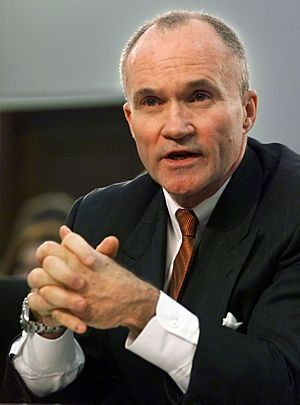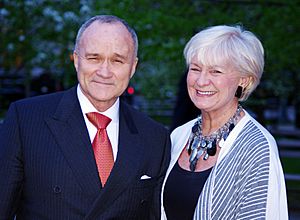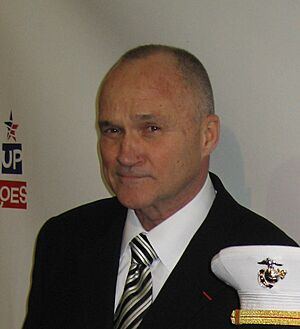Raymond Kelly facts for kids
Quick facts for kids
Raymond Kelly
|
|
|---|---|

Kelly in 1999
|
|
| 37th and 41st Police Commissioner of New York City | |
| In office January 1, 2002 – December 31, 2013 |
|
| Mayor | Michael Bloomberg |
| Preceded by | Bernie Kerik |
| Succeeded by | Bill Bratton |
| In office September 1, 1992 – January 1, 1994 Acting: September 1, 1992 – October 16, 1992 |
|
| Mayor | David Dinkins |
| Preceded by | Lee Brown |
| Succeeded by | Bill Bratton |
| 16th Commissioner of the United States Customs Service | |
| In office July 31, 1998 – January 19, 2001 |
|
| President | Bill Clinton |
| Preceded by | George Weise |
| Succeeded by | Robert Bonner |
| Under Secretary of the Treasury for Terrorism and Financial Intelligence | |
| In office June 3, 1996 – July 30, 1998 |
|
| President | Bill Clinton |
| Preceded by | Ronald Noble |
| Succeeded by | Jim Johnson |
| Personal details | |
| Born |
Raymond Walter Kelly
September 4, 1941 New York City, U.S. |
| Political party | Independent |
| Spouse | Veronica |
| Children | 2, including Greg |
| Education | Manhattan University (BA) St. John's University (JD) New York University (LLM) Harvard Kennedy School (MPA) |
| Military service | |
| Allegiance | |
| Branch/service | |
| Years of service | 1963–1966 (active) 1966–1996 (reserve) |
| Rank | |
| Battles/wars | Vietnam War |
| Police career | |
| Department | |
| Rank | |
Raymond Walter Kelly (born September 4, 1941) is an American police officer. He served as the longest-running Police Commissioner in the history of the New York City Police Department (NYPD). He was also the first person to hold this important job two separate times.
Kelly spent 45 years working for the NYPD. He served in 25 different police units. He was Police Commissioner from 1992 to 1994. He returned to the role from 2002 until 2013. Kelly was the first person to start as a Police Cadet and become Police Commissioner. He held almost every rank in the department.
After the 1993 World Trade Center bombing, Kelly was considered for the role of FBI Director. He later served in other important government jobs. These included being a Marine Corps Reserve colonel. He was also a director of police for the United Nations Mission in Haiti. He was even a vice president for Interpol. During the Clinton administration, Kelly worked for the Treasury Department. He was the Under Secretary for Enforcement and Customs Service Commissioner.
In March 2014, Kelly became President of Risk Management Services at Cushman & Wakefield. This is a real estate company in New York City. In 2015, the New York Post reported that Kelly thought about running for New York City Mayor.
Contents
- Early Life and Education
- Military Service
- Beginning His Police Career
- 37th NYC Police Commissioner
- Transition of Leadership
- 41st NYC Police Commissioner
- Other Important Roles
- Private Sector Work
- Department of Homeland Security Discussion
- Anti-terrorism and Safety Efforts
- Affiliations and Personal Life
- Awards and Honors
- See also
Early Life and Education
Raymond Kelly was born on September 4, 1941, in New York City. He grew up in the Upper West Side of Manhattan. His father, James F. Kelly, was a milkman. His mother, Elizabeth Kelly, worked at Macy's.
Kelly graduated from Archbishop Molloy High School in 1959. He earned a Bachelor of Business Administration degree from Manhattan University in 1963. He also has a law degree (J.D.) from St. John's University. He holds another law degree (LL.M.) from New York University School of Law. Plus, he has a Master of Public Administration (M.P.A.) from Harvard Kennedy School.
Kelly has also received many honorary degrees from various colleges and universities.
Military Service
Kelly is a veteran of the Vietnam War. He became a second lieutenant in the United States Marine Corps in 1963. In 1965, he went to the Republic of Vietnam. As a first lieutenant, Kelly led Marines in battles for 12 months. This included taking part in Operation Harvest Moon.
After returning to the U.S., Raymond Kelly joined the Marine Corps Reserves. He retired after 30 years of service. He held the rank of colonel in the Marine Corps Reserves.
Beginning His Police Career
Kelly started with the New York City Police Department as a police trainee in 1960. Six years later, in 1966, he became a Patrolman. He finished first in his class at the New York City Police Academy. He also passed the sergeant's test after coming back from Vietnam.
Some people criticized his quick rise through the ranks. They felt he didn't have enough experience as a regular police officer. However, his long service was very different from his predecessor, Bernard Kerik. Kerik was an NYPD officer for only 8 years before becoming commissioner.
First Deputy Commissioner Role
On February 9, 1990, Kelly was named First Deputy Commissioner. This was during the time Mayor David Dinkins was in office. Kelly worked under New York City Police Commissioner Lee Brown.
Kelly was promoted from a Two-Star Assistant Chief to the First Deputy position. This meant he moved up over several higher-ranking officers.
37th NYC Police Commissioner
On October 16, 1992, Mayor Dinkins appointed Kelly as the 37th Police Commissioner of New York City. Kelly took charge of a police department that was becoming more diverse. He worked to recruit more minority officers. He even attended black church services to help with recruitment.
Crime rates in the U.S. began to fall in 1993. This was during Kelly's first time as commissioner. Kelly believed in "community policing." This means police work closely with local communities. He helped reduce crime in New York by starting the "Safe Streets, Safe City" program. This program put thousands more police officers on the streets. This made them more visible and able to connect with people.
As Commissioner, he also focused on smaller issues that affected daily life. The murder rate in New York City dropped from 2,254 in 1990 to 1,927 when Kelly left in 1994. The crime rate continued to fall even more when Kelly returned as commissioner under Mayor Bloomberg.
1993 World Trade Center Attack
The first terrorist attack on the World Trade Center happened on February 26, 1993. Kelly was police commissioner at that time. He led his department through the investigation of the bombing.
NYPD Handgun Change in 1993
In August 1993, Kelly allowed officers to use 9mm semi-automatic pistols. These new pistols replaced older revolvers. Kelly, who had been a street cop, was concerned about these new guns jamming. At an event introducing the new pistols, one of them did indeed malfunction.
Transition of Leadership
In November 1993, Rudolph Giuliani won the election for Mayor of New York City. He replaced Kelly with William Bratton, who was the police commissioner in Boston. Giuliani and Kelly had known each other for a long time. They had attended Manhattan University together decades earlier.
41st NYC Police Commissioner
As Commissioner under Mayor Michael Bloomberg, Kelly often attended community events. He was seen playing drums at the Brooklyn West Indian Day Parade. He also spoke with community leaders.
Bloomberg and Kelly continued to use the CompStat system. This system helps police track and reduce crime. While it was good at lowering crime, it also put pressure on local police units. They were pushed to reduce reports of major crimes and increase minor arrests.
The two leaders also continued the controversial "stop-and-frisk" policy. This policy allowed police to stop and search people. A court case, Floyd v. City of New York, later found this policy to be unconstitutional. It was seen as a form of racial profiling. In the first half of 2011, the NYPD made 362,150 such stops. Most of the people stopped were Black or Latino. Nine out of ten stops did not lead to an arrest or ticket.
Under Mayor Bloomberg, Commissioner Kelly also changed the NYPD into a top-notch counter-terrorism operation. This was done with the help of the CIA. Before the September 11, 2001 attacks, fewer than two dozen officers worked on terrorism full-time. Ten years later, there were over 1,000.
One of Kelly's new ideas was to place New York City police detectives in other cities around the world. They would go after terrorist attacks to see if there was any connection to New York's safety. For example, after the 2004 Madrid bombing and the 2005 London bombings, NYPD detectives were there quickly. They sent important information back to New York.
An August 2011 article reported that the NYPD used undercover agents. These agents watched stores, restaurants, mosques, and clubs. An NYPD spokesperson said officers only followed leads. He denied that police just watched ethnic neighborhoods.
The FBI's general counsel, Valerie Caproni, said the FBI cannot send agents into mosques without evidence of wrongdoing. She said this would go against basic constitutional rights like freedom of religion. However, state agencies like the NYPD do not have the same limits as the FBI.
Under Mayor Bloomberg, Kelly's NYPD also faced criticism for how it handled protests. This included the 2004 Republican National Convention protests. The city had to pay millions to settle lawsuits for false arrests. There was also criticism for how reporters were treated during the 2011 Occupy Wall Street demonstrations.
In 2012, Kelly oversaw the launch of the Domain Awareness System. This is a computer system used for Police surveillance in New York City.
In 2013, Kelly's visit to Brown University was met with protests. People protested what they saw as increased racial profiling and civil rights violations under his leadership.
In November 2014, it was reported that Kelly no longer needed a $1.5 million security team. This was after he moved into the private sector. Before this, Kelly had 24-hour protection from ten NYPD officers. This team cost New York City taxpayers $1.5 million. The NYPD had said this was needed due to threats against Kelly. Kelly decided he was no longer a target.
Other Important Roles
Director of International Police Monitors
Kelly worked as the director of the International Police Monitors in Haiti. This was from October 1994 to March 1995. This U.S.-led group helped stop human rights abuses. They also set up a temporary police force there. For his work in Haiti, President Bill Clinton praised Kelly. Kelly also received an award from the Chairman of the Joint Chiefs of Staff.
Under Secretary for Enforcement
From 1996 to 1998, Kelly was Under Secretary for Enforcement at the United States Department of the Treasury. In this job, he oversaw several important law enforcement agencies. These included the Customs Service and the Secret Service.
Interpol Executive Committee
Kelly was part of the executive committee for Interpol. He was elected vice president for the Americas from 1996 to 2000.
Commissioner of U.S. Customs Service
From 1998 to 2001, Kelly was the commissioner of the U.S. Customs Service. He managed 20,000 employees and a large annual budget.
Chairman of New York State Athletic Commission
In 2001, Governor George Pataki appointed Kelly to lead the New York State Athletic Commission. He resigned in 2002 to focus on his duties as police commissioner.
Private Sector Work
Kelly was a Senior Managing Director for Corporate Security at Bear Stearns from 2000 to 2001. He also worked as the head of the New York office for Investigative Group International. This was a private investigations company.
After leaving his job as New York City Police Commissioner, Kelly joined a speakers bureau in 2014. He also works for K2 Intelligence, which is an investigative consulting firm.
Kelly, a retired Marine Colonel, was the Grand Marshal of the 95th annual Veterans Day parade in New York City in 2014. He marched with his wife, who was in the Coast Guard Reserve.
In August 2021, Kelly joined the advisory board of Clearview AI. This is an American company that develops facial recognition technology.
Department of Homeland Security Discussion
In July 2013, Secretary of Homeland Security Janet Napolitano announced she was leaving her job. Kelly was immediately mentioned as a possible replacement. President Obama called Kelly "one of the best there is" and "very well qualified for the job."
Kelly said he was "flattered" by Obama's praise. However, some groups opposed his possible nomination. A coalition of Muslim groups wrote a letter to Obama. They said Kelly's time in New York was linked to "divisive, harmful and ineffective policing." Kelly wrote an article defending the NYPD's programs. He stated that their practices had saved many lives, especially those of young men of color.
On October 17, 2013, President Obama nominated Jeh Johnson for the role. Johnson was confirmed as DHS Secretary in December 2013.
Anti-terrorism and Safety Efforts
Civil Liberties Discussions
On October 16, 2011, the New York Civil Liberties Union filed a lawsuit. They wanted the NYPD to release Commissioner Kelly's daily schedules. They said he was a very important city official. They noted that other high-ranking officials, like the U.S. President, share parts of their schedules.
In Kelly's defense, some argued that a police commissioner needs privacy. Especially after the 9/11 attacks. They said he was like a "secretary of defense" for New York City. However, the New York Times argued that transparency was important. They pointed out that they had to sue to get police data in the past.
Interview on 60 Minutes
On September 25, 2011, Kelly was interviewed on the TV show 60 Minutes. He spoke about anti-terrorism measures in New York City. He mentioned the NYPD's $3-billion Joint Operations Center. This center includes representatives from the military, FBI, and other agencies.
During the interview, Kelly stated that the NYPD had ways to take down a plane in an extreme situation. He did not give details. He also mentioned that Lower Manhattan has thousands of surveillance cameras. These cameras can identify suspicious packages and track people. The NYPD also uses special detectors for radiation on boats, helicopters, and officers' belts.
Affiliations and Personal Life
Since becoming Police Commissioner, Kelly has been the honorary president of the Police Athletic League of New York City (PAL). This group helps inner-city children and teens.
Kelly has also been a member of the Harvard Club of New York City. His membership and costs were paid by the privately funded New York City Police Foundation.
Kelly is known for being fit and fashionable. He regularly exercises. He also favors custom-made shirts and silk ties. He believes good quality clothing helps his public image as an authority figure.
Kelly met his wife, Veronica, at Island Park, New York. They have two children, including Greg Kelly, who is a TV and radio host.
Awards and Honors
- Upon graduating from the New York City Police Academy, Kelly won the "Bloomingdale Trophy." This was for his high scores in shooting, academics, and physical fitness.
- He has received 15 awards for excellent service in the New York City Police Department.
- In 2003, he was named Father of the Year by the National Father's Day Committee.
- On March 16, 2006, Irish America named Kelly Irish American of the Year.
- On June 19, 2006, he received the Gold Medal from The Hundred Year Association of New York. This was for his contributions to New York City.
- On September 9, 2006, Kelly received the Légion d'honneur. This is a high French award.
- On March 17, 2010, Kelly was the Grand Marshal of the 249th New York City St. Patrick's Day Parade.
- On March 14, 2012, Kelly was inducted into Irish America magazine's Hall of Fame.
See also
- New York City Police Department
- NYPD Cricket League
 | Delilah Pierce |
 | Gordon Parks |
 | Augusta Savage |
 | Charles Ethan Porter |



